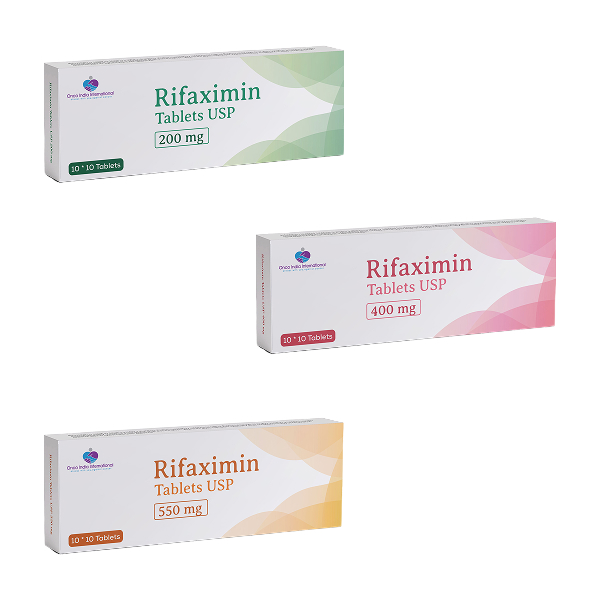Rifaximin (Xanovo)
| Product/Composition | Rifaximin Tablets |
|---|---|
| Form | Tablets |
| Strength | 200mg, 400mg & 550mg |
| Production Capacity | 50000 |
| Packaging | 10 X 10 Tablets / Box |
| Therapeutic use | Anti biotic/ Anti infective/ Anti fungal |
| Package Insert/Leaflet | Available upon request |
Rifaximin Tablets – Overview
Rifaximin Tablets are oral antibiotics used primarily to treat gut infections caused by bacteria. Unlike many antibiotics, rifaximin works locally in the intestines and is minimally absorbed into the bloodstream. This targeted action reduces systemic side effects while effectively treating intestinal infections.
Doctors commonly prescribe rifaximin for:
-
Traveler’s diarrhea
-
Irritable bowel syndrome with diarrhea (IBS-D)
-
Hepatic encephalopathy, a complication of liver disease
Patients with chronic gut issues, such as IBS-D, may use rifaximin repeatedly under medical supervision. It is essential to take the medication exactly as prescribed.
Effective Uses of Rifaximin Tablets
Rifaximin is approved for the following conditions:
-
Traveler’s diarrhea: Caused by harmful bacteria such as E. coli in contaminated food or water.
-
Irritable bowel syndrome with diarrhea (IBS-D): Helps manage frequent loose stools, abdominal discomfort, and bloating.
-
Hepatic encephalopathy: Reduces toxin accumulation in patients with liver failure, improving brain function.
-
Small intestinal bacterial overgrowth (SIBO): Sometimes used off-label to balance gut bacteria.
Note: Rifaximin is ineffective against viral infections like the flu or common cold. Misuse can increase bacterial resistance.
How Rifaximin Works
Rifaximin binds to the RNA of harmful gut bacteria, blocking protein synthesis essential for their survival. Most of the drug remains in the intestines, reducing absorption into the bloodstream, which limits side effects elsewhere in the body. Its local action makes rifaximin safe and effective for gut-specific infections.
Key Medical Benefits
-
Targeted treatment: Acts only in the intestines, minimizing effects on other organs.
-
Low systemic absorption: Safe for patients with kidney concerns.
-
Reduced bacterial resistance: Slow adaptation due to its unique mechanism.
-
Quick symptom relief: Often within 24–48 hours for traveler’s diarrhea.
-
Flexible dosing: Short courses (3–14 days) for acute or chronic conditions.
-
Minimal drug interactions: Compatible with most medications.
Contraindications
Do not use rifaximin if you have:
-
Allergy to rifamycins (e.g., rifampin, rifabutin)
-
Bowel obstruction
-
Severe liver disease (requires monitoring)
-
Clostridioides difficile infection
Always inform your doctor about pregnancy, breastfeeding, and prior medical conditions before starting rifaximin.
Recommended Usage
-
Traveler’s diarrhea: 200 mg, three times daily for 3 days.
-
IBS-D: 550 mg, three times daily for 14 days. Repeat courses may be prescribed every 6 months if symptoms recur.
-
Hepatic encephalopathy: 550 mg, twice daily; long-term use may be necessary.
Tips: Take doses with water, do not crush or chew tablets, and complete the full course to prevent relapse.
Side Effects
Common: Nausea, headache, dizziness, gas, stomach pain, fatigue.
Less common: Loss of appetite, muscle cramps, dry mouth.
Serious (seek immediate help):
-
Watery or bloody diarrhea (possible C. difficile infection)
-
Skin rash, itching, or swelling (allergic reaction)
-
Dark urine, yellow eyes/skin (liver issues)
Older patients may experience more pronounced side effects.
Special Precautions
-
Pregnancy & breastfeeding: Use only if benefits outweigh risks.
-
Drug interactions: Inform your doctor about immunosuppressants, antifungals, or other antibiotics.
-
Liver/kidney disease: Monitoring may be required.
-
Alcohol: Avoid excessive intake.
-
Probiotics: Consult your doctor before use.
Missed Dose
If a dose is missed, take it as soon as remembered. If the next dose is near, skip the missed dose. Do not double up.
Overdose
In case of overdose, seek medical help immediately. Do not try to self-treat. Provide the medical team with details of the tablets taken.
Safety Advice
-
Store in the original packaging, away from children and pets.
-
Do not share medication.
-
Complete the prescribed course.
-
Monitor any unusual symptoms and report to your healthcare provider.
Special Dietary & Lifestyle Recommendations
-
Hydration: Drink water or electrolyte-rich fluids.
-
IBS-D diet: Follow a low-FODMAP plan; eat smaller, frequent meals.
-
Limit alcohol: Supports liver function and drug effectiveness.
-
Stress management & exercise: Light activity and relaxation techniques help reduce symptoms.
-
Supplements: Consult your doctor regarding probiotics or zinc after completing the course.
Storage Instructions
-
Keep tablets in a tight, light-resistant container.
-
Store at room temperature, away from heat, moisture, and sunlight.
-
Check expiration dates regularly and dispose of expired tablets safely.
Manufacturer
Rifaximin Tablets are manufactured by Onco India International, a trusted global pharmaceutical company committed to providing high-quality, safe, and effective medications for gut health and other medical conditions.
